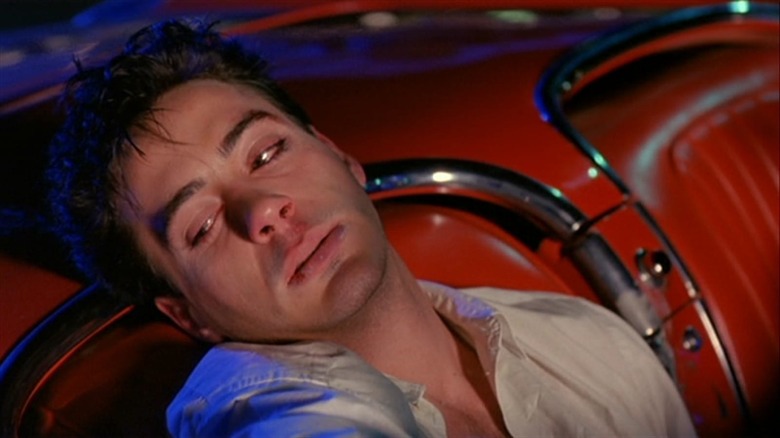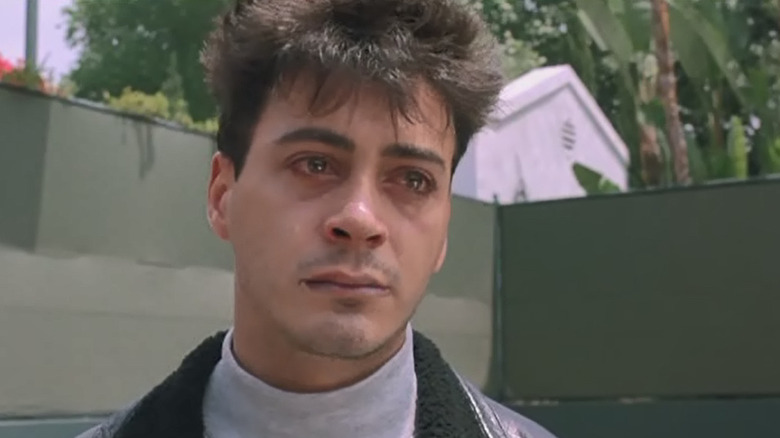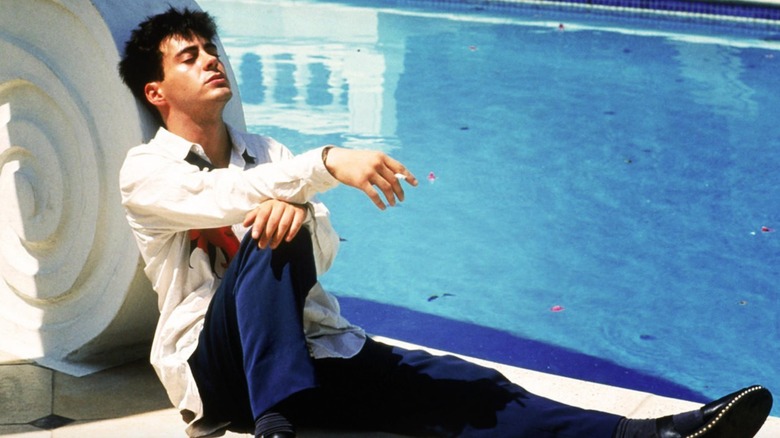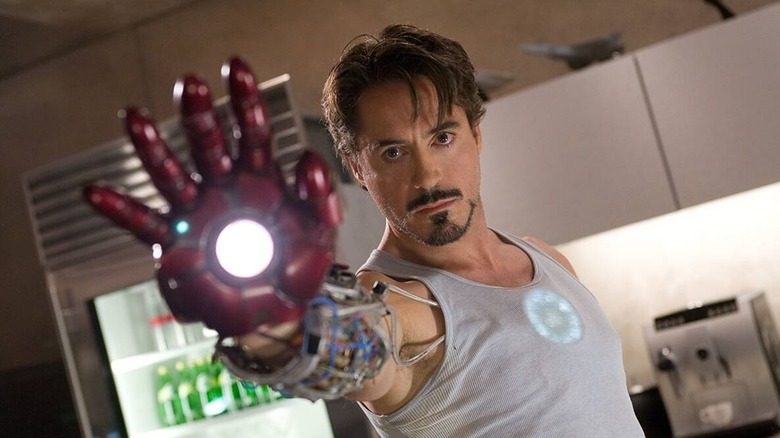This Less Than Zero Scene Gave Robert Downey Jr. Validation On A Film Set For The First Time
Sometimes life imitates art, and other times, art imitates life. In the case of "Less Than Zero," it's impossible to miss the glaring similarities between star Robert Downey Jr. and his character Julian Wells. Loosely based on Bret Easton Ellis' debut novel of the same name, the 1987 film is, on its surface, about rich white kids doing too many drugs in Los Angeles. However, "Less Than Zero" is a powerful story about addiction that boasts unforgettable performances from Andrew McCarthy, Jami Gertz, and especially Robert Downey Jr. It's also beautifully shot by cinematographer Edward Lachman, who would later go on to earn Oscar nominations for his work on "Far From Heaven" and "Carol." Plus, the film has a great soundtrack.
"Less Than Zero" follows Clay (McCarthy), as he comes home from college to find his former girlfriend Blair (Gertz) and his best friend Julian not only sleeping together, but also doing a whole lot of cocaine. Born with so many advantages, Julian, in particular, has lost everything. That doesn't prevent him from digging his hole ever deeper as the movie progresses, though. After all, many who've struggled with addiction will tell you that there's really no such thing as rock bottom: one can always find a lower place.
The film received mixed reviews at the time of its release and has been largely forgotten in the years since, but Downey's harrowing performance will always be burned into my brain. It turns out that director Marek Kanievska made the young actor feel truly validated on set for the first time. What did Kanievska say to make Downey feel this way?
'Oh this is important'
Downey explained on an episode of "Off Camera with Sam Jones" that "Less Than Zero" director Marek Kanievska gave him his first feelings of true validation on set. The actor was twenty-two at the time. According to Downey, Kanievska was no fan of the Hollywood machine and pretty much bailed as soon as he was done shooting, rather than see what "a movie with a message and some heart and some depth" would get turned into by the studio — which certainly did take some liberties with the finished product. Kanievska was also "super critical" of Downey's development, and the director's process was unlike anything the actor had ever experienced in his film work prior. Downey specifically mentions the movie's tennis court scene, a gut-wrenching exchange between Julian and his father (Nicholas Pryor) in which the son asks for help after his addiction has spiraled completely out of control.
Kanievska asked everyone on set to be quiet and pay close attention to Downey's performance, because it would be "special" and "difficult," and they would all be to blame if Downey couldn't get to the emotional place he needed to reach for the scene. The actor said, "He set it up so that I felt like, 'Oh this is important and now I have to do my part.'" Downey also explained that the director knew he was "pretty nutty" but still believed in how talented he was. The actor understood the stakes given to him by Kanievska and said he needed to come up with a system of going "zero to sixty" because he couldn't have everyone just waiting around for him.
The ghost of Christmas future
Downey went on to discuss what he considers to be some of the most vital aspects of acting, explaining, "It's like a great chef. Two most important things: a sense of urgency and attention to detail. Without a sense of urgency, you're never going to be able to survive in the film industry, because they're not 112 hour days until you're feeling it. They're 12 hour days."
Downey said that in the moment, he considered whether a father and son can ever truly connect with and understand one another, which gave him what he needed. He credits Kanievska with giving him the space not only to "come up with something that was indelibly watchable and believable," but also appreciated the way he made everyone stop what they were doing on that tennis court so Downey could "dig up the goods." The actor never forgot the way this made him feel, and cites the film as a favorite that he's acted in.
He was also deeply affected by the role of Julian. Downey told The Guardian:
"Until that movie, I took my drugs after work and on the weekends. Maybe I'd turn up hungover on the set, but no more so than the stuntman. That changed on 'Less Than Zero' ... the role was like the ghost of Christmas future. The character was an exaggeration of myself. Then things changed and, in some ways, I became an exaggeration of the character. That lasted far longer than it needed to last."
A new chapter
Perhaps the greatest redemption story at the heart of the Marvel Cinematic Universe is the one that took place behind the scenes. Robert Downey Jr. had been on track to becoming one of the greatest actors of his generation before his addiction took him down a very different path. The performer made headlines throughout the late '90s and very early aughts not for his acting chops, but for running into trouble with drugs time and again. A typical Hollywood story, perhaps, but nonetheless heartbreaking. It's wild to remember that only a few years before stepping into Iron Man's boots, Downey was a persona non grata in the film industry.
According to his wife, Susan Downey, the actor cleaned up sometime in 2003. Slowly, Downey began rebuilding his career, leading up to his rather meteoric rise after taking on the role of Tony Stark in 2008's "Iron Man" – a part that the studio was very hesitant to hire him for due to his past struggles. Downey clawed his way out of a quagmire few ever truly escape from and wound up one of Hollywood's most bankable and well-respected stars.
As someone who's been in recovery for years, Downey's character in "Less Than Zero" has long resonated with me. I rewatched the movie recently and that tennis court scene still breaks my heart, because I remember having similar conversations with my own family. Downey's performance is an absolute gut punch. I'm grateful every day that my story didn't end in tragedy the way Julian's does, and I still find Downey's journey incredibly inspiring. The truth is, our odds aren't great and addiction is a foe that is never truly vanquished. The best any of us can do is take it one day at a time.



